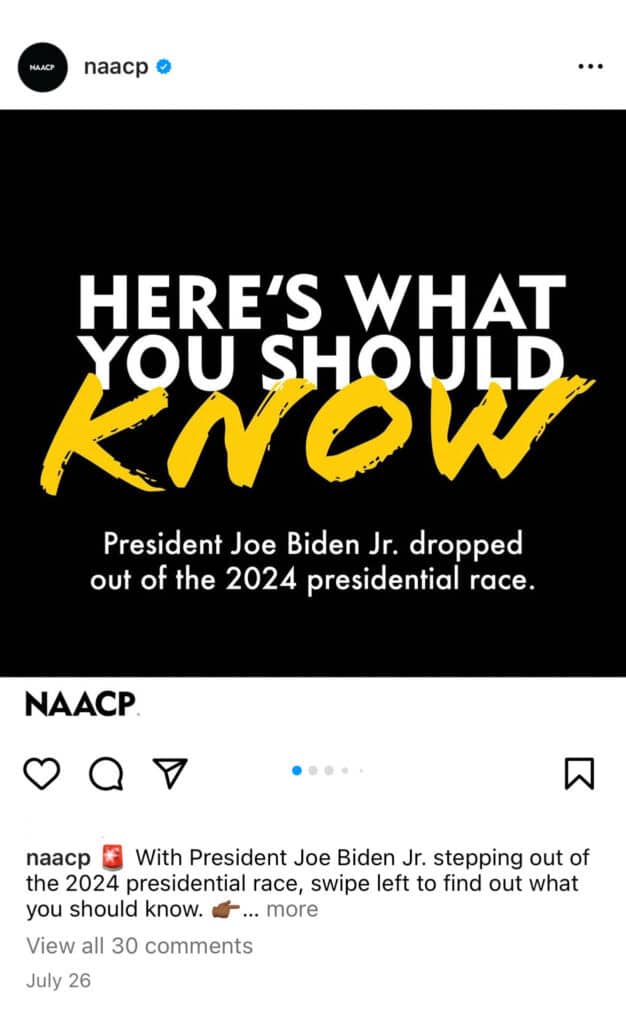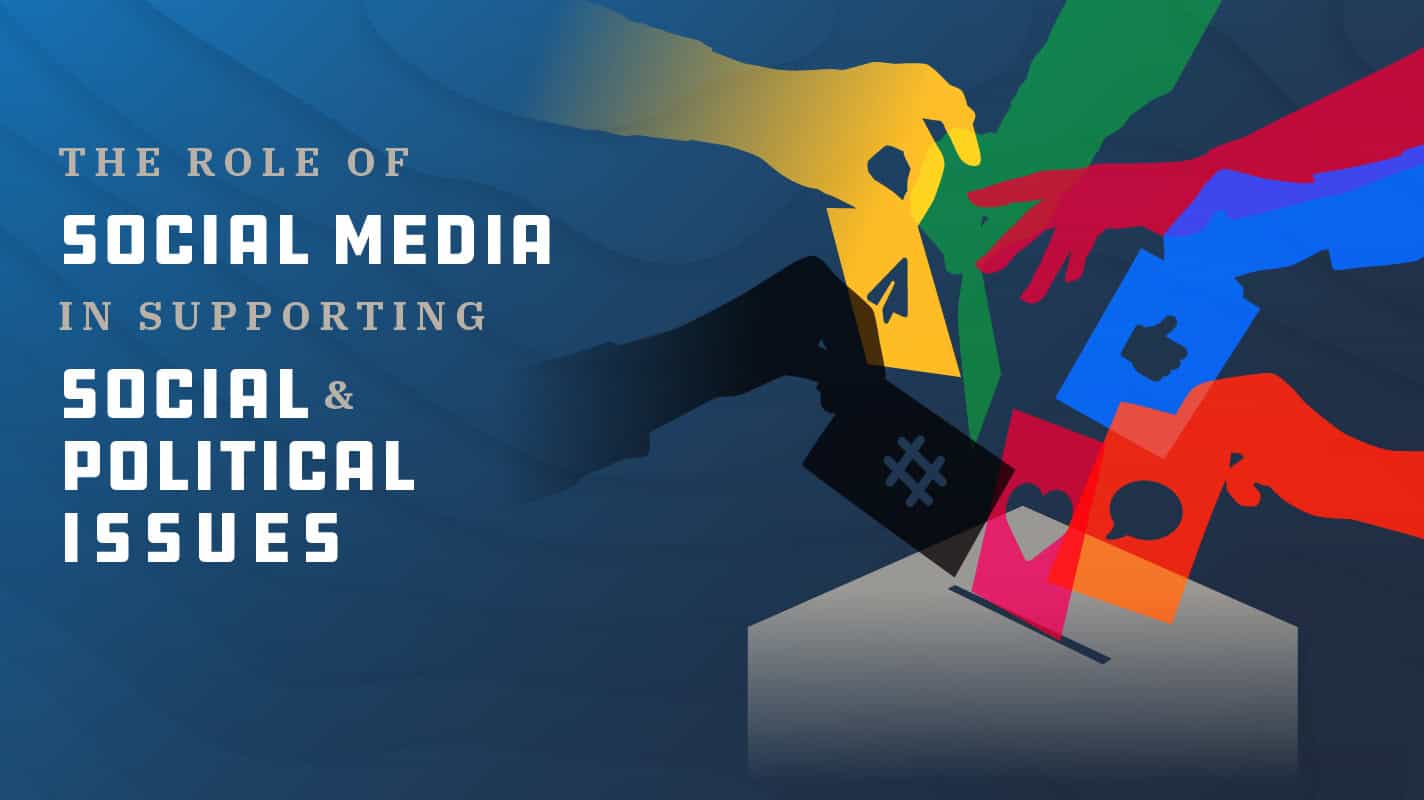As the 2024 presidential election season is upon us, the role of social media in supporting social and political issues becomes increasingly significant. Social media platforms have transformed how we communicate, advocate, and mobilize for change. Let’s explore the power of social media in addressing social and political issues, the benefits and challenges it presents, and best practices for brands and organizations to engage in advocacy responsibly and effectively.
The Power of Social Media in Advocacy
Social media has democratized the way voices are heard, and movements are mobilized. It allows individuals and organizations to amplify their messages, connect with like-minded communities, and drive meaningful change. From raising awareness about critical social and political issues to organizing large-scale protests, social media has become an indispensable tool for advocacy.




During this presidential election cycle, candidates are leveraging social media like never before. Notably, Vice President Kamala Harris’s campaign is setting trends by engaging extensively on platforms like TikTok. Her team’s innovative use of social media is not just about sharing policy positions but creating relatable content that resonates with younger audiences, showcasing the evolving landscape of political engagement.
Conversely, former President Donald Trump created his own social media platform, Truth Social. After being banned from major platforms like Twitter (X) and Facebook, Trump launched Truth Social to connect directly with his supporters and disseminate information without the restrictions imposed by traditional social media channels. This move highlights social media’s significant role in political communication, underscores how platforms can be tailored to specific audiences and agendas, and illustrates the evolving landscape of political discourse in the digital age.
Benefits of Using Social Media for Social and Political Advocacy
- Reach a Broader Audience: Social media platforms have millions of users worldwide, enabling advocates to reach a diverse and extensive audience. This global reach can help spread awareness about social and political issues far and wide.
- Facilitate Real-Time Communication and Updates: Social media allows for instant communication and real-time updates, making it easier to share information, mobilize supporters, and coordinate actions quickly.
- Foster Community Engagement and Participation: Social media platforms provide spaces for communities to come together, share their experiences, and support each other. This sense of community can strengthen advocacy efforts and encourage participation.
- Enable Grassroots Movements and Campaigns: Social media empowers grassroots movements by providing a platform for individuals and smaller organizations to organize, share their stories, and gain visibility. In some ways, it levels the playing field a bit, allowing even those with limited resources to make an impact.
Challenges and Risks of Political Engagement on Social Media
While social media offers numerous benefits for advocacy, it also presents some challenges and risks:
- Spread of Misinformation and Fake News: The rapid spread of information on social media can sometimes lead to the dissemination of misinformation (aka “fake news”). This can confuse the public, undermine advocacy efforts, and have dangerous consequences.
- Echo Chambers and Polarization: Social media algorithms often prioritize content that aligns with users’ existing beliefs, creating echo chambers and contributing to political polarization. This can hinder productive dialogue and compromise the ability to find common ground.
- Risks of Online Harassment and Trolling: Advocates and organizations may face online harassment, trolling, and cyberbullying. This can create a hostile environment and discourage individuals from participating.
Best Practices for Brands and Organizations
To effectively support social and political issues on social media, brands, and organizations should follow these best practices:
- Authenticity and Transparency: Be genuine and transparent in your advocacy efforts. Ensure that your actions align with your brand values and that you are not simply jumping on the bandwagon for publicity.
- Staying Informed and Educated on Issues: Stay informed about the issues you advocate for. Educate yourself and your team to ensure accurate and respectful representation of the issues.
- Engaging with Diverse Perspectives: Engage with a wide range of perspectives to foster inclusive and respectful dialogue. Listen to and amplify marginalized voices within the community.
- Encouraging Respectful Dialogue and Debate: Promote respectful discussions on your platforms. Set clear guidelines for interaction and moderate discussions to prevent harassment and trolling.
How to Get Started
- Identify Key Issues Aligned with Your Brand Values: Choose issues that resonate with your brand values and mission. Ensure that your advocacy efforts are genuine and align with your overall brand identity.
- Develop a Clear and Consistent Message: Craft a clear and consistent message that effectively communicates your stance on the issues. Ensure that your messaging is authentic and resonates with your audience.
- Create Engaging and Informative Content: Develop content that educates, informs, and engages your audience. Use a variety of formats, such as videos, infographics, and articles, to convey your message effectively.
- Monitor and Measure Impact: Track the performance of your advocacy efforts using analytics tools. Measure engagement, reach, and impact to understand the effectiveness of your campaigns and make data-driven adjustments.
Social media plays a crucial role in supporting social and political issues. It’s essential to approach advocacy with authenticity, transparency, and a commitment to fostering respectful dialogue. Start using your social media platforms to support the causes you believe in, and as always – Be Nice, Make Better.
Ready to Amplify Your Social Impact? Connect with Seventh Scout!
Whether you’re navigating the intersection of social media and political activism or seeking to enhance your brand’s social impact, our team is here to help. At Seventh Scout, we specialize in crafting strategic social media marketing solutions that resonate with audiences and drive results. Let’s collaborate to tailor a bespoke social media strategy that aligns with your business goals and values. Together, let’s amplify your voice and make a lasting impact.



